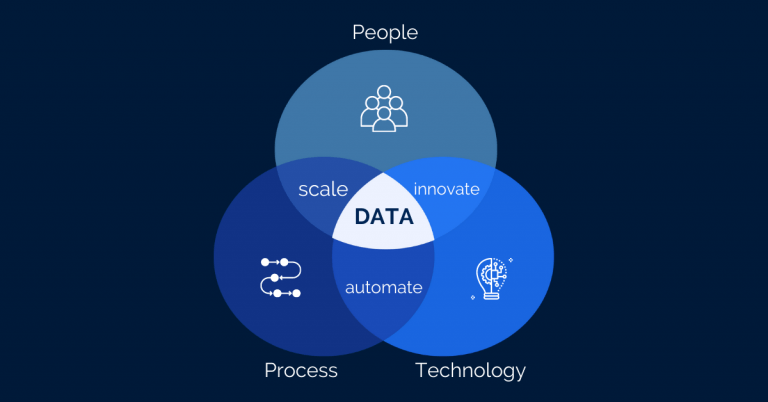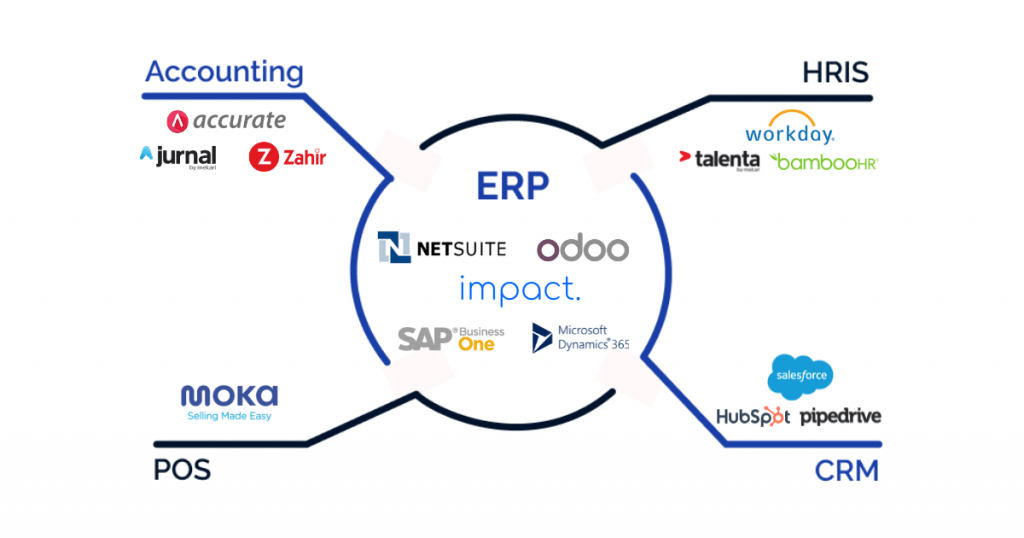Best ERP Software for Indonesian Businesses in 2025
There is no such thing as the best ERP software. ERP exists to automate and…
Nindy
December 31, 2024
As shown in the previous chapters, there are four key factors in digital transformation success:
This chapter will talk about the technology side of digital transformation.
Not any technology can support digital transformation. The technology has to help companies in the following ways:
Part of the goal of digital transformation is to improve productivity with the hope that the company can achieve more (more clients, more client satisfaction, more revenue, and eventually more profits) without adding more resources than what the company will get back in return
Therefore, automation is a crucial part of digital transformation. Without it, your people will keep doing administrative tasks without moving the company forward.
Accounting software helps your accounting department manage accounting data and, to a certain extent, automate the process of creating reports. However, it does not automate the process of getting those data. Accounting data comes from different departments (operations, sales, human resources, etc), and many companies collect those data using different tools which have to be inputted manually to the accounting software.
These manual processes take time and can introduce a lot of data inaccuracies due to 2 reasons:
This brings us to the next point, integration across departments.
As shown above, technologies with automation itself is not enough for a successful digital transformation. Without integration across departments, companies will need someone to manually integrate these data. A lot of companies appoint their accounting managers to do this, but it often times bring more problems than solutions, because:
Even if a technology automate works with integration across departments, if the technology does not bring meaningful data that help business leaders improve processes and make strategic business decisions, the software will not be much helpful in the company’s digital transformation efforts.
Our criteria of what makes data meaningful are:
As discussed in Chapter 3, communication is an important part of digital transformation as many companies fail their digital transformation efforts due to lack of communication. As such, it is also equally important to have a technology that supports communication within and across departments.
An ERP (Enterprise Resource Planning) is a software used by businesses to automate and integrate their business. It consists of many modules to be used by different departments, including accounting, inventory, purchasing, sales, CRM, HRIS, POS, project management, manufacturing, eCommerce, and many more.
The idea of ERP is one software for all departments, which is fundamentally different compared to other business software where they focus on solving specific problems within one department. As such, what makes ERP different is essentially the integration across departments and the data analytics (also known as Business Intelligence).
| ERP | Other Business Software | |
|---|---|---|
| Goal | Increase long-term profits | Improve productivity |
| User | Leaders, managers, staffs | Managers, staffs |
| Selling Points | Automation, integration, data analytics | Time-saving features |
Most commonly used business software in Indonesia are shown below:

ERP is an excellent technology for companies undergoing digital transformation because:
Learn more about how our ERP can beneficial to Indonesian businesses
Most of the time, inefficiencies are present in all departments in various forms. Sometimes it’s the data accuracy and speed, other times it’s task execution and monitoring. Companies will then need different software for different departments. However, with an ERP, companies only need one software to automate work within departments.
Unfortunately, inefficiencies across departments are often a much bigger problem for companies at Stage 3 and above, regardless of whether the company leaders realize this. This is why integration across departments is crucial and this is where ERP shines.
Integration across departments is arguably the single most important factor why companies install ERPs in their companies. By having an integrated software, business processes across departments can be automated and optimized. As described in Chapter 3, process optimization is one of the key factors in digital transformation.
Therefore, ERP does not only save the time it takes to do administrative work, but also the time it takes to integrate the different data from different departments.
This brings us to the next topic: data quality.
For data to be of high quality and meaningful, they have to be:
Fortunately, ERP can provide meaningful data.
Firstly, an ERP directly collects data from the source and stores it in a single location, reducing the exposure to human errors. This data can still be inaccurate (since the person inputting the data can still make human errors), but this can be minimized by putting restrictions.
Secondly, the data is more complete than any other business software because an ERP collects data from different departments, not just one department. Therefore, business leaders can better see the big picture of the company and can make better business decisions. For example, if a business leader has data from sales, marketing, accounting, operations, and HR departments, the leader will be able to assess better where his efforts will make a greater impact to the company.
We often see business leaders who can’t see the big picture put too much focus on either sales or operations. Although it may be true that those areas need a lot of improvements, but so do other departments.
If business leaders are able to realize this, they should realize how important it is to focus on activities that are repeatable and sustainable (i.e. building systems and procedures) so that their companies don’t have to keep relying on them. And once business leaders try to do this, they will also realize how important hiring and retaining great people is in ensuring their companies’ sustainability. This is the essence of digital transformation.
“Hiring great people and building systems and procedures are the essence of digital transformation”
Thirdly, data collection from ERP happens in real-time. This brings two benefits:
Lastly, it’s about data being actionable. Data from ERP may or may not be actionable depending on the ERP implementation quality. This will be further discussed in Chapter 5 in more details, but our initial recommendations are:
Another thing we would like to add is that, as much as possible, you should not outsource your digital transformation to a consultant. There is no one who understands your company as much as the business leaders. In addition, the ability to digitally transform your business is a very useful and valuable skill for you to master if you want your company to keep growing.
This may be counterintuitive since Impact is a digital transformation consultant, but from our point of view, we’d rather work with companies who have clear goals and understand that digital transformations require a lot of effort and commitment, because we know that we will bring more impact to our clients when they do.
In summary, ERP is an excellent technology for companies undergoing digital transformation. However, the success of your ERP implementation highly depends on your clarity of your digital transformation goals, plans, and commitment to make it happen. Things often will not go according to plan, but with the right mindset and people, we believe you will make it through.
If, after reading Chapter 1-4, you still don’t know what to do, we’d suggest speaking with each of your departments to get a better understanding of the big picture of your company. Start collecting the pain points they are feeling.
But remember, their opinions are from the points of view of their own positions and departments, so the accounting manager may have different opinions from the accounting staff, and the accounting manager may have different opinions from the warehouse or sales or HR manager (although they may be referring to the same problem). It’s best if you can gather all parties involved and have a discussion in front of all of them.
Moreover, the solutions they offer may seem random and not be the most impactful solution due to the lack of data. It’s your job to collect those information, fill in the missing pieces, and form the big picture. At the very least, you will be able to identify what data are missing so you know you need to start collecting the data during your digital transformation.
We believe there is so much potential for Indonesian businesses to grow if businesses receive the right data, tools, and guidance.
Impact Insight Team
Impact Insights Team is a group of professionals comprising individuals with expertise and experience in various aspects of business. Together, we are committed to providing in-depth insights and valuable understanding on a variety of business-related topics & industry trends to help companies achieve their goals.
75% of digital transformation projects fail. Take the right first step by choosing a reliable long-term partner.
